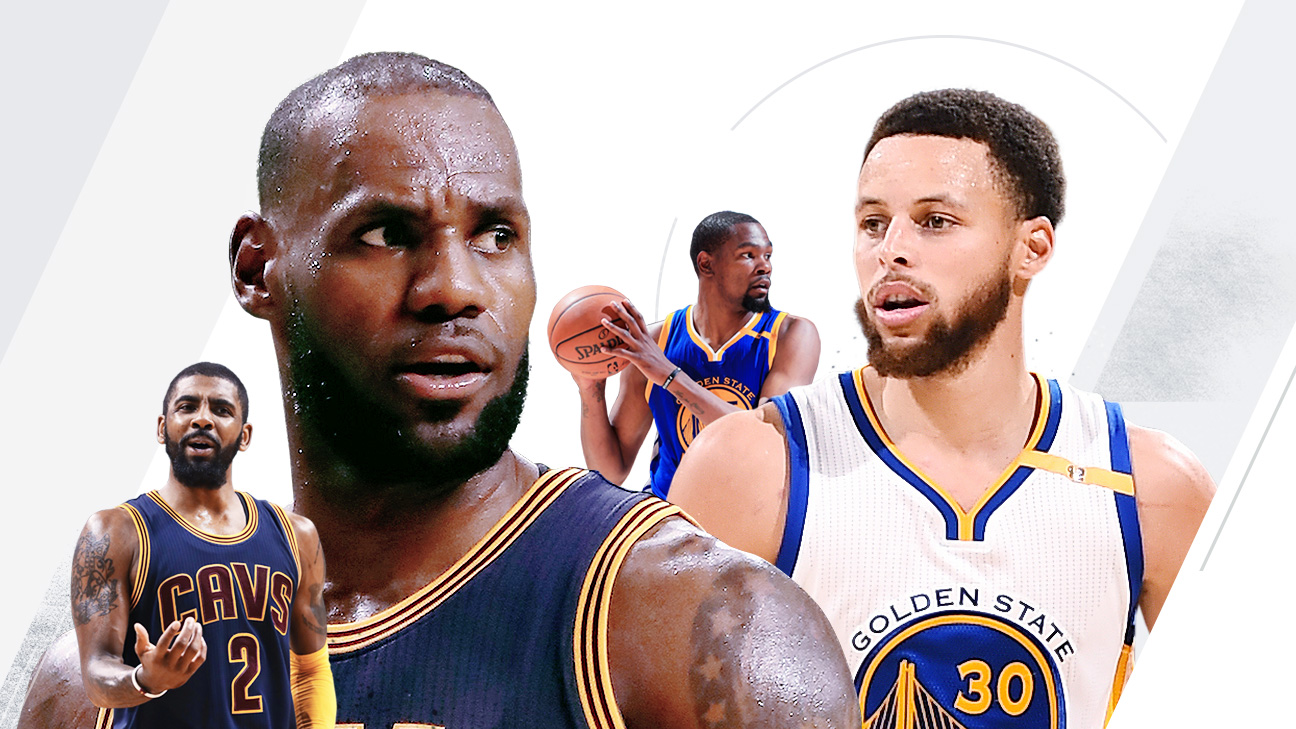NBA Finals: A Preview

The NBA Finals are finally upon us.
We’ve been waiting expectingly all year for this. A third consecutive meeting of the Cavaliers and Warriors in the NBA Finals. As tough as the top teams have played this year, this outcome has seemed imminent from the get-go. For one thing, in the postseason alone, they are a combined 24-1. The Warriors ran through every opponent in the playoffs. Comparatively, the Cavs, with the exception of a rough game 4 against Boston, have done the same. Not to mention LeBron James has played at a level we have never seen from him. He’s surpassed Michael Jordan as the league’s all-time scorer in the playoffs. Meanwhile, each team’s roster includes 11 players who have appeared in an All-Star Game.
It has quickly become a classic Finals rivalry. With Game 1 set to begin in Oakland this coming Thursday, it’s time to run the numbers and figure out, if we can, who will emerge as the NBA Finals champs come the end of June. LeBron said it best when he told the press, “Both teams are better than last year’s teams. Now what does that mean? We don’t know yet.”
Turning on the Star Power
ELEVEN All-stars on each team. That’s a crazy number. No doubt it’s this star power that’s gotten each team this far three years running. There’s no doubt that each team stacks up offensively. Stephen Curry has maintained an offensive RPM (real plus/minus) of 7.05 — the highest of any player in the Finals. While LeBron has come in with a 6.18 rpm. Now what does that mean?
In essence, it signifies how much each player can be counted on to make a major difference on the offensive side of the ball. Let’s look at Curry and James’ postseason numbers.
LeBron James:
- PPG – 32.5
- FG% – .566
- APG – 7.0
- RPG – 8.0
- SPG – 1.2
- BPG – .6
- Turnovers – 3.9
Stephen Curry:
- PPG – 28.6
- FG% – .502
- APG – 5.6
- RPG – 5.5
- SPG – 1.9
- BPG – .3
- Turnovers – 3.3
While these are strong numbers from both players, they are by no means the linchpins for a Finals victory. For the Warriors, Curry might not even be the best player on the team. Kevin Durant is playing crazy well (25.2 PPG, 7.8 RPG, 3.7 APG, .556 FG% in 33.4 minutes a night). Draymond Green has been a monster defensively — which we’ll discuss more in a second. And Klay Thompson has played a significant role as well in the Warriors’ success.
While for the Cavs, we cannot underestimate the impact of Kevin Love and Kyrie Irving, as well as Tristan Thompson — who has become an important force for Cleveland down low. Love is averaging a double-double in points and rebounds (17.2 PPG, 10.4 RPG). Irving’s clutch performances down the line have lifted the Cavs time and again. He’s made a name for himself, facilitating, slashing, and maintaining serious efficiency with the ball in his hands. When the game is on the line, he gives the Cavs a serious weapon outside of LeBron.
Offensive Differences
Comparing these two teams offensively is difficult. The Warriors thrive on an efficient, well-formulated fast-break, spot-shooting offense (they score a league-high 18.5 percent of their points in transition). While the Cavs run an isolation-heavy offense, averaging 0.99 points per play in isolation, which they run a league-high 11.9 percent of the time. When they’re not in transition, the Warriors utilize lots of screens to create open opportunities. But that’s about where they diverge heavily. In terms of pick and roll, the Cavs have a slight edge as they do in the post. But with cuts and off-screen scoring, Golden State wins that battle.
Defense wins this championship
As much as we focus on the offensive prowess of each team, this Finals matchup is going to come down to one very important thing: Defense.
The teams matchup rather evenly offensively. They’re shooting equally well. Each keep their offensive turnovers low. They get to the line with regularity. Players rebound consistently in the front court. But on defense, that changes. In the post season, the Warriors held opponents to 102.0 points per game, and a .416 field goal percentage. The Cavs held their opponents to 103.2 points per game, and a FG percentage of .450. In terms of weaknesses, the Warriors rank 29th in defensive rebounding (74.9%, compared to the league average 76.7) and the Cavs rank 29th in defensive turnover percentage (11.4%, average is 12.7).
X-Factors for each team
We’re pretty much in agreement as to who are the major forces for each team heading into the NBA Finals. But what about the hidden value? The X-factors? For the Warriors, it’s got to be Draymond Green. His basketball IQ is through the roof. He snags 1.92 steals and 2.08 blocks a game. And he’s not afraid to play rough — currently he’s got the highest FPG (fouls per game) of any player in the series with 3.2. If he can manage to keep his fouls low for the first three quarters, he’ll demand extra attention and consideration from Cleveland coach Tyronn Lue.
For the Cavaliers, it’s easy to say it’s one of the Big Three. Obviously they will need consistent strong performances from James, Love, and Irving through every game. But if it’s not any of them, it’s got to be Tristan Thompson.
It’s not easy being Tristan
Now he may not be a massive force offensively. But that’s not what this guy is about. His whole career he’s been saddled with questions about his worth — can he be enough of an offensive force? Can he show up every night at a high level? But one thing has been consistent for Thompson: he’s committed himself to being a tenacious rebounder and defensive player. He’s got a knack for making players disappear offensively. And he refuses to accept anything less than complete and utter domination in the back-court. For example, this is a guy who, after allowing Derrick Rose to clinch game 3 of the conference semifinals with a long range three, spent his postgame crying alone in the showers.
Thompson might not be the talk of the media. He might get overlooked. But if the Warriors want to win the NBA Finals, they’ve got to figure out a way to contain Thompson. Otherwise he will wreak havoc in the most important ways. It’s taken some time, but Thompson has found his place on the floor. Not only has he maximized his core skills — perfecting his play on the glass and his sticktoitiveness on defense — but he’s also improved his rough spots — developing a crushing floater reminiscent of Al Jefferson. In these regards, he has become essential to the Cavs’ success.
Who will win the NBA Finals?
If you look at the numbers of each team side-by-side, the Warriors have a major edge. ESPN’s Basketball Power Index favors Golden State by a huge margin of 93%. For one thing, they have home court advantage. In the last 21 finals, teams with that edge have gone 15-6. Not to mention the acquisition of Kevin Durant fills some much needed gaps on offense.
But, here’s the thing: anything can happen in this league. Find me someone who expected LeBron James to explode as he has in this postseason and I’ll find you a liar. Heading into the playoffs, pundits said he was too tired, too worn down, too demoralized by a rough stretch at season’s end. And yet, he has played more minutes in the postseason than in the regular season — and has shown up in that regard. Sure, the numbers point to the Warriors. But the way the Cavs have performed thus far, we can only be certain of one thing:
This NBA Finals series is going to be one for the ages.



